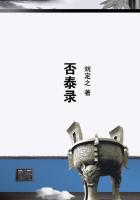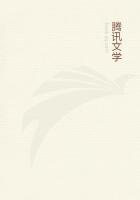Pro.That is a question which does not deserve an answer.
Soc.Right; and you would say the same, if I am not mistaken, of the earth which is in animals and the earth which is in the universe, and you would give a similar reply about all the other elements?
Pro.Why, how could any man who gave any other be deemed in his senses?
Soc.I do not think that he could-but now go on to the next step.
When we saw those elements of which we have been speaking gathered up in one, did we not call them a body?
Pro.We did.
Soc.And the same may be said of the cosmos, which for the same reason may be considered to be a body, because made up of the same elements.
Pro.Very true.
Soc.But is our body nourished wholly by this body, or is this body nourished by our body, thence deriving and having the qualities of which we were just now speaking?
Pro.That again, Socrates, is a question which does not deserve to be asked.
Soc.Well, tell me, is this question worth asking?
Pro.What question?
Soc.May our body be said to have a soul?
Pro.Clearly.
Soc.And whence comes that soul, my dear Protarchus, unless the body of the universe, which contains elements like those in our bodies but in every way fairer, had also a soul? Can there be another source?
Pro.Clearly, Socrates, that is the only source.
Soc.Why, yes, Protarchus; for surely we cannot imagine that of the four classes, the finite, the infinite, the composition of the two, and the cause, the fourth, which enters into all things, giving to our bodies souls, and the art of self-management, and of healing disease, and operating in other ways to heal and organize, having too all the attributes of wisdom;-we cannot, I say, imagine that whereas the self-same elements exist, both in the entire heaven and in great provinces of the heaven, only fairer and purer, this last should not also in that higher sphere have designed the noblest and fairest things?
Pro.Such a supposition is quite unreasonable.
Soc.Then if this be denied, should we not be wise in adopting the other view and maintaining that there is in the universe a mighty infinite and an adequate limit, of which we have often spoken, as well as a presiding cause of no mean power, which orders and arranges years and seasons and months, and may be justly called wisdom and mind?
Pro.Most justly.
Soc.And wisdom and mind cannot exist without soul?
Pro.Certainly not.
Soc.And in the divine nature of Zeus would you not say that there is the soul and mind of a king, because there is in him the power of the cause? And other gods have other attributes, by which they are pleased to be called.
Pro.Very true.
Soc.Do not then suppose that these words are rashly spoken by us, OProtarchus, for they are in harmony with the testimony of those who said of old time that mind rules the universe.
Pro.True.
Soc.And they furnish an answer to my enquiry; for they imply that mind is the parent of that class of the four which we called the cause of all; and I think that you now have my answer.
Pro.I have indeed, and yet I did not observe that you had answered.
Soc.A jest is sometimes refreshing, Protarchus, when it interrupts earnest.
Pro.Very true.
Soc.I think, friend, that we have now pretty clearly set forth the class to which mind belongs and what is the power of mind.
Pro.True.
Soc.And the class to which pleasure belongs has also been long ago discovered?
Pro.Yes.
Soc.And let us remember, too, of both of them, (1) that mind was akin to the cause and of this family; and (2) that pleasure is infinite and belongs to the class which neither has, nor ever will have in itself, a beginning, middle, or end of its own.
Pro.I shall be sure to remember.
Soc.We must next examine what is their place and under what conditions they are generated.And we will begin with pleasure, since her class was first examined; and yet pleasure cannot be rightly tested apart from pain ever Pro.If this is the road, let us take it.
Soc.I wonder whether you would agree with me about the origin of pleasure and pain.
Pro.What do you mean?
Soc.I mean to say that their natural seat is in the mixed class.
Pro.And would you tell me again, sweet Socrates, which of the aforesaid classes is the mixed one?
Soc.I will my fine fellow, to the best of my ability.
Pro.Very good.
Soc.Let us then understand the mixed class to be that which we placed third in the list of four.
Pro.That which followed the infinite and the finite; and in which you ranked health, and, if I am not mistaken, harmony.
Soc.Capital; and now will you please to give me your best attention?
Pro.Proceed; I am attending.
Soc.I say that when the harmony in animals is dissolved, there is also a dissolution of nature and a generation of pain.
Pro.That is very probable.
Soc.And the restoration of harmony and return to nature is the source of pleasure, if I may be allowed to speak in the fewest and shortest words about matters of the greatest moment.
Pro.I believe that you are right, Socrates; but will you try to be a little plainer?
Soc.Do not obvious and every-day phenomena furnish the ******st illustration?
Pro.What phenomena do you mean?
Soc.Hunger, for example, is a dissolution and a pain.
Pro.True.
Soc.Whereas eating is a replenishment and a pleasure?
Pro.Yes.
Soc.Thirst again is a destruction and a pain, but the effect of moisture replenishing the dry Place is a pleasure: once more, the unnatural separation and dissolution caused by heat is painful, and the natural restoration and refrigeration is pleasant.
Pro.Very true.
Soc.And the unnatural freezing of the moisture in an animal is pain, and the natural process of resolution and return of the elements to their original state is pleasure.And would not the general proposition seem to you to hold, that the destroying of the natural union of the finite and infinite, which, as I was observing before, make up the class of living beings, is pain, and that the process of return of all things to their own nature is pleasure?
Pro.Granted; what you say has a general truth.















